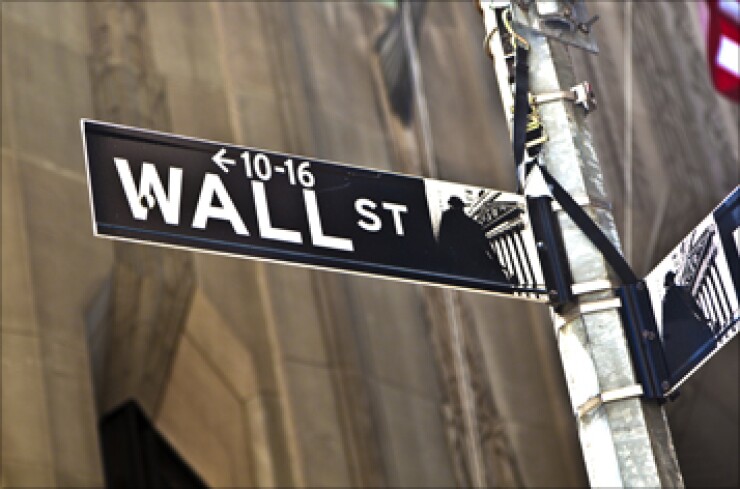Titans of finance, already threatened by President Biden’s push for the biggest tax hike on wealthy Americans in decades, face another peril: Progressives are demanding action on a long-stalled requirement that Washington clamp down on Wall Street bonuses.
Behind the scenes, consumer groups such as Public Citizen and Better Markets are reminding administration officials that the never-finished pay constraints are mandatory under the Dodd-Frank Act. Democrats — upset that the rules languished when Donald Trump occupied the White House — are also exerting pressure, arguing that years after the 2008 financial crisis, banks’ compensation practices continue to incentivize dangerous behavior.
The limits are “critical to reining in the reckless Wall Street culture that encourages executives to juice their pay with risky, short-term gains,” Massachusetts Sen. Elizabeth Warren, a well-known critic of lavish bonuses, said in a statement. “It’s long past time regulators revisit the rule and use it to prevent greedy executives from crashing our economy again.”

The pay strictures are among Dodd-Frank’s most controversial provisions, with watchdogs putting them off even during the Obama administration — a time when the government was eager to tighten Wall Street’s leash.
Regulators had been hesitant to insert themselves into how private companies reward employees. Also, because the economy can’t function if bankers completely shelve their animal spirits, it proved difficult to strike the right balance between allowing some risk but not too much. And considering how important annual bonuses are to financial executives, lobbying over the issue has been intense going back a decade.
'Never finalized'
“It’s revealing that of the hundreds of rules in Dodd-Frank, this is one of the few that’s never been finalized,” said Bartlett Naylor, a financial-policy advocate at Public Citizen. Naylor said his group has met with Biden administration officials who gave the impression that “they don’t want to let four years pass and not get this done.”
“People can be highly confident” that Biden’s financial watchdogs will implement the regulations, said Dennis Kelleher, the president of Better Markets, which advocates for aggressive oversight of banks and other firms.
White House officials declined to comment.
Unlike the
High-profile blowups like last month’s collapse of Archegos Capital Management, Bill Hwang’s family office, aren’t helping the financial industry’s cause. The implosion contributed to more than $10 billion of combined losses for firms including Credit Suisse Group AG, Nomura Holdings, UBS Group and Morgan Stanley. Fed Chairman Jerome Powell said the incident
‘Long overdue’
Biden’s regulators “must complete the long overdue protections to stop executives from endangering the economy to pay themselves,” Senate Banking Committee Chairman Sherrod Brown, an Ohio Democrat, said in a statement.
The language in Dodd-Frank, which lawmakers passed in 2010, was broad: Congress required a crackdown on compensation that can trigger material losses by encouraging inappropriate risks. Figuring out how to do that was left to the Fed, SEC, Federal Deposit Insurance Corp., Office of the Comptroller of the Currency, Federal Housing Finance Agency and National Credit Union Administration.
A never-adopted 2016
Banks have long bristled that the rules are unnecessary and unfair. Lenders say they proactively made changes after the 2008 crisis, like forcing executives to wait longer to receive performance-based pay and unveiling new policies to recoup bonuses following big losses and allegations of wrongdoing.
Such reforms were on display last year when Goldman Sachs Group Inc. clawed back pay from ex-CEO Lloyd Blankfein and several other former managers after the firm paid more than $5 billion to settle
Competitive disadvantage
Banks and their lawyers also say privately that no other industry faces similar federal constraints. At a time when firms are engaged in an arms race for talent with Silicon Valley and other sectors, adding pay rules on top of the glut of existing post-crisis regulations might prompt candidates to ask, “Why bother pursuing a career in finance?”
“By subjecting banks to these requirements, you’re putting them at a severe disadvantage when it comes to retention and talent,” said Henry Eickelberg, chief operating officer of the HR Policy Association, a trade group that represents human resource officers at large corporations. “You’re going to cause them to have to pay more.”
Wall Street should have plenty of time to sharpen its lobbying strategy because imposing the limits will probably be a long-term project, despite progressives’ demands for urgency. Holdovers appointed by Trump still run some of the relevant agencies, and Biden won’t be able have all his nominees in place for another two years. It’s also expected to take a while for six different watchdogs to agree on how to proceed, write the rules, propose them and then approve an overhaul.
A key figure in the debate will be SEC Chairman Gary Gensler because the agency was a major driver of the 2016 proposal and an earlier one released in 2011. The former Goldman Sachs partner gained a reputation as a hard-nosed regulator and Wall Street adversary when he ran the Commodity Futures Trading Commission during the Obama administration.
The heads of the six agencies haven’t met to discuss the pay constraints since Biden’s inauguration. The OCC “remains committed to implementing the rules required by law,” said spokesman Bryan Hubbard, who added that regulators have issued guidelines that nudged the industry to change its practices. Spokespeople for the other agencies declined to comment.
Progressives' ideas
When regulators start evaluating what to do, they will have no shortage of ideas from progressives to consider. For instance, Sarah Anderson, who directs the global economy project at the Institute for Policy Studies, would like to see senior executives put some of their bonus money into central pots that would be tapped if their firms are fined by regulators — so managers have stakes in the punishments.
“That would do a lot to change the culture on Wall Street,” she said. “As long as we have such massive bonuses, it’s just very difficult to have confidence in the banking system that people aren’t going to take really reckless actions to hit those jackpots.”





